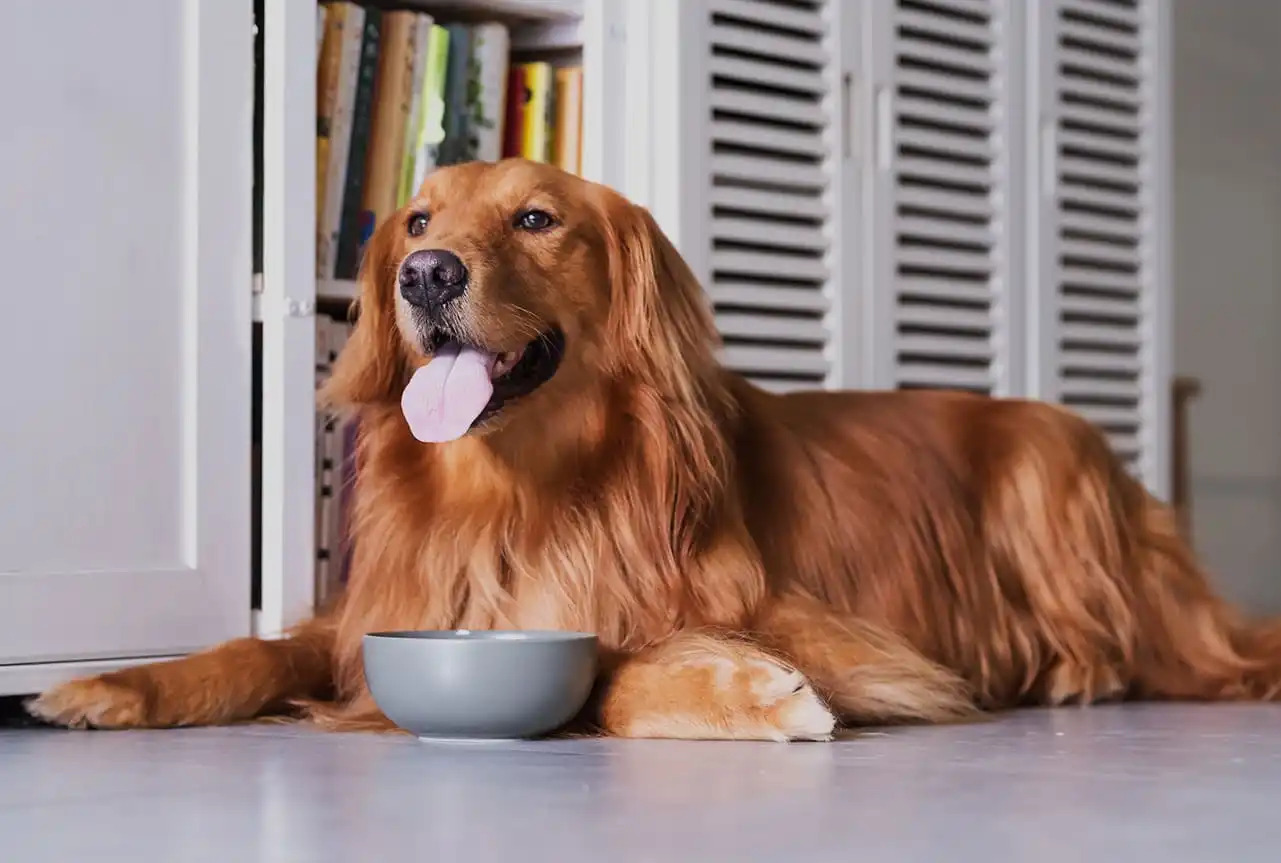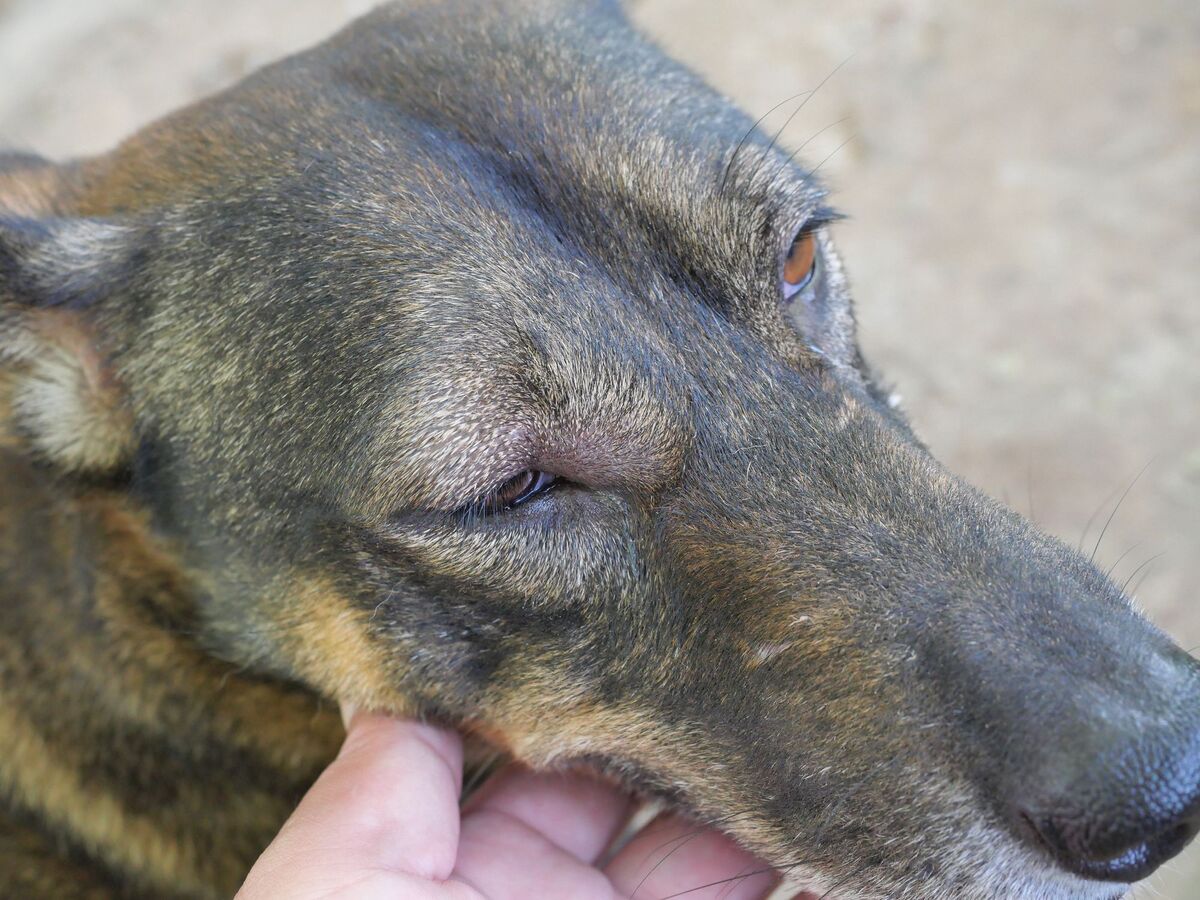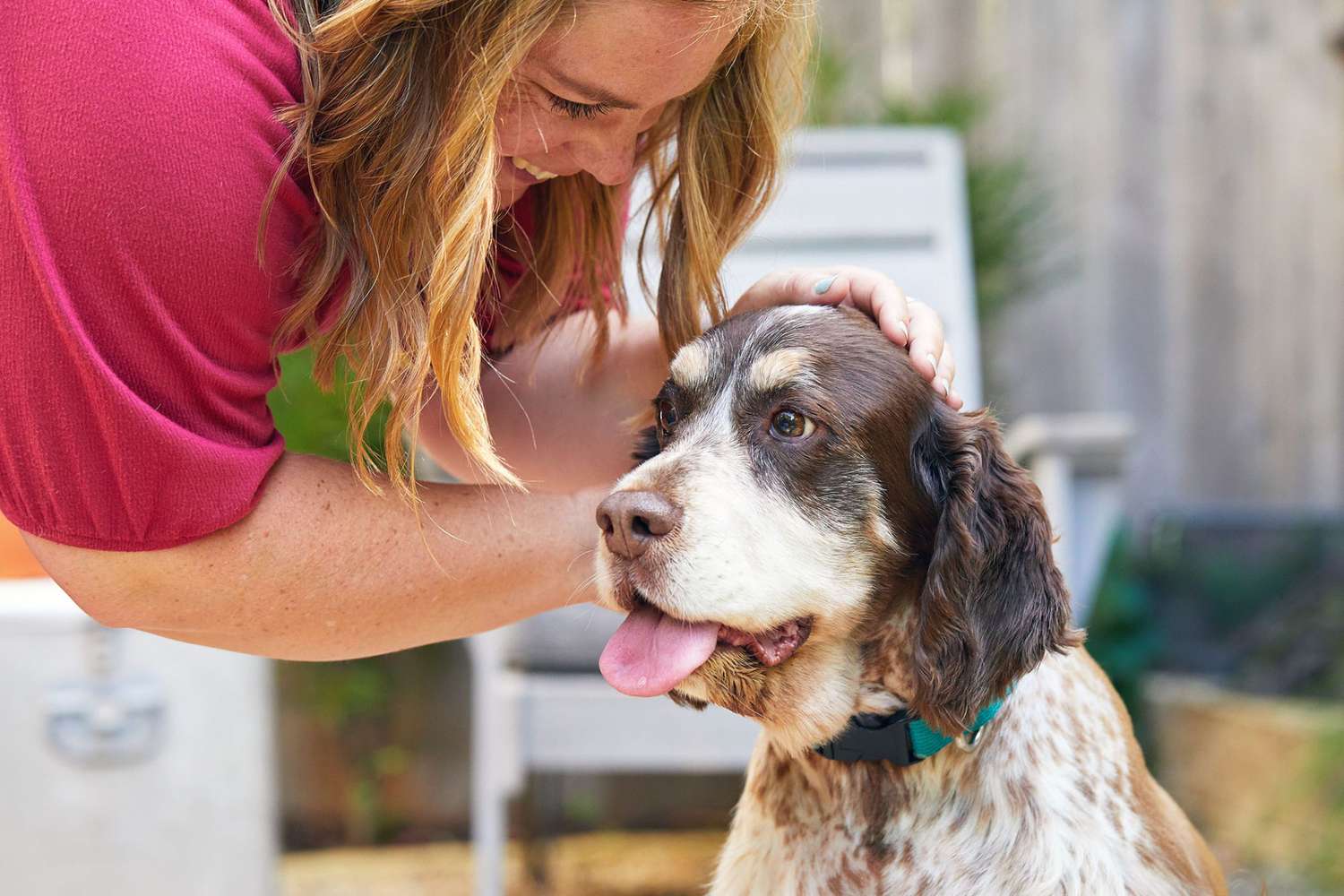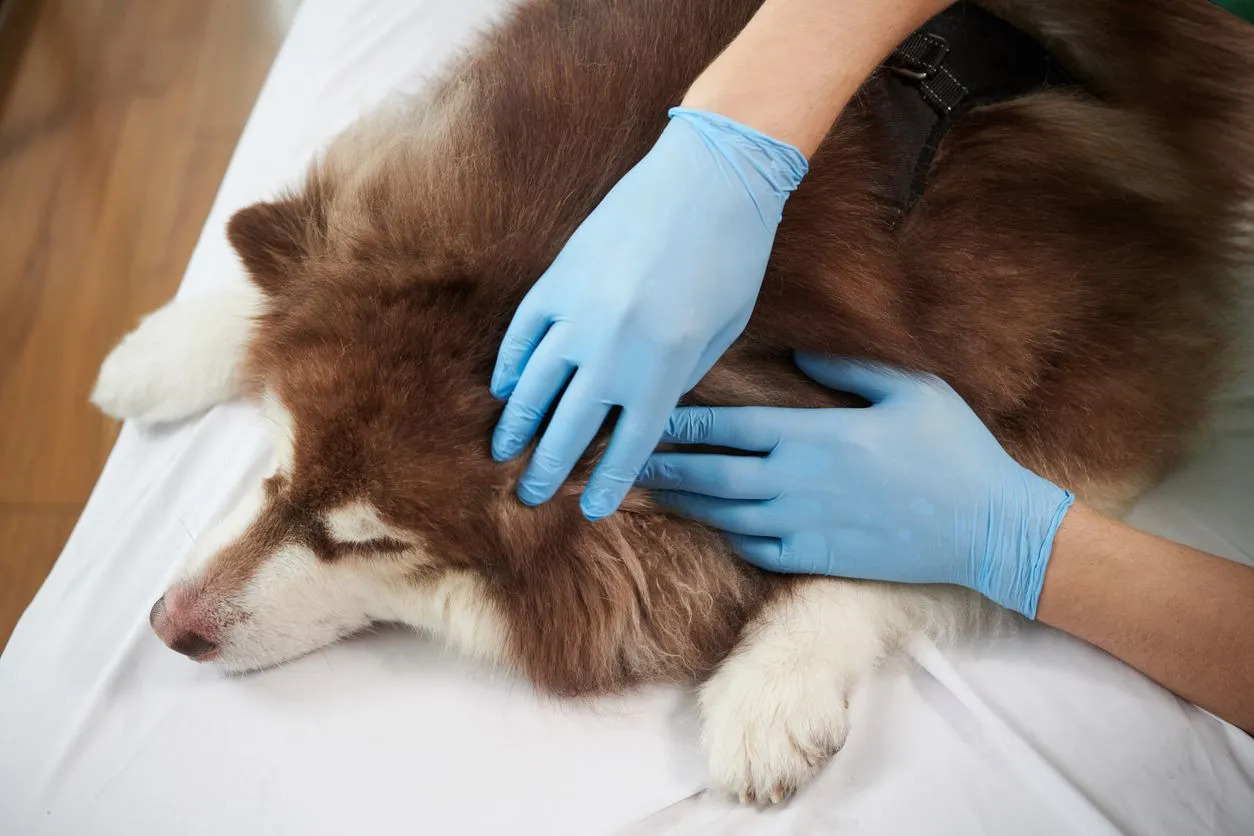Home>Health & Wellness>Behavior & Cognitive Care>Why A Senior Dog Does Not Eat


Behavior & Cognitive Care
Why A Senior Dog Does Not Eat
Modified: February 21, 2024
Learn why senior dogs may experience changes in appetite and how behavior and cognitive care can help address this issue. Understand the reasons behind a senior dog's decreased appetite and find solutions to support their well-being.
(Many of the links in this article redirect to a specific reviewed product. Your purchase of these products through affiliate links helps to generate commission for Pawsomeoldies.com, at no extra cost. Learn more)
Table of Contents
Introduction
As our beloved canine companions age, they may experience changes in their eating habits that can be concerning for pet parents. A senior dog not eating can be a distressing sight, prompting worries about their health and well-being. Understanding the reasons behind this change in behavior is crucial for providing the best care for our aging furry friends.
In this comprehensive guide, we will delve into the various factors that can contribute to a senior dog's decreased appetite. By exploring both health-related issues and behavioral changes, we aim to shed light on the complexities of a senior dog's eating habits. Additionally, we will provide practical tips for encouraging a senior dog to eat and offer guidance on when to seek veterinary care for a decreased appetite in senior dogs.
Join us as we embark on a journey to unravel the mysteries behind a senior dog's reluctance to eat, gaining valuable insights that will empower pet parents to support their aging canine companions with compassion and knowledge.
Read more: Why Does My Senior Dog Keep Whining?
Common Reasons for Senior Dogs Not Eating
Senior dogs may exhibit a decline in their appetite for various reasons, some of which are common among aging canines. Understanding these factors is essential for identifying potential issues and providing appropriate care for our senior furry friends. Here are some common reasons why senior dogs may experience a decreased appetite:
-
Dental Problems: As dogs age, they are prone to dental issues such as gum disease, tooth decay, and oral pain. These conditions can make chewing and swallowing food uncomfortable, leading to a reluctance to eat.
-
Digestive Disorders: Senior dogs may develop gastrointestinal issues such as gastritis, inflammatory bowel disease, or pancreatitis, which can cause discomfort and lead to a decreased appetite.
-
Reduced Sense of Smell and Taste: Aging canines may experience a decline in their sense of smell and taste, making food less appealing to them. This diminished sensory perception can contribute to a loss of interest in eating.
-
Medication Side Effects: Senior dogs often require medications to manage various age-related health conditions. Some medications can cause nausea, stomach upset, or changes in taste, which may deter a dog from eating.
-
Stress and Anxiety: Changes in the home environment, such as the introduction of a new pet, moving to a new house, or the absence of a family member, can trigger stress and anxiety in senior dogs, leading to a loss of appetite.
-
Underlying Health Conditions: Age-related ailments such as arthritis, organ dysfunction, cancer, and hormonal imbalances can impact a senior dog's overall well-being and appetite.
-
Dietary Preferences and Changes: Senior dogs may develop specific dietary preferences or aversions as they age. Additionally, changes in their regular diet or feeding routine can affect their willingness to eat.
-
Environmental Factors: Factors such as extreme temperatures, loud noises, or disruptions in their feeding area can create discomfort and unease, influencing a senior dog's eating habits.
Understanding these common reasons for a senior dog's decreased appetite can guide pet parents in addressing potential issues and providing the necessary support and care for their aging canine companions.
Health Issues That Can Affect a Senior Dog's Appetite
Senior dogs, like humans, are susceptible to a range of health issues as they age, and these conditions can significantly impact their appetite. Understanding the potential health-related factors that may contribute to a senior dog's decreased appetite is crucial for proactive care and timely intervention. Here are some prevalent health issues that can affect a senior dog's appetite:
Dental Problems:
As dogs age, they are prone to dental issues such as gum disease, tooth decay, and oral pain. These conditions can make chewing and swallowing food uncomfortable, leading to a reluctance to eat. Additionally, untreated dental problems can progress to more severe issues, causing chronic discomfort and further diminishing a senior dog's interest in food.
Digestive Disorders:
Senior dogs may develop gastrointestinal issues such as gastritis, inflammatory bowel disease, or pancreatitis, which can cause discomfort and lead to a decreased appetite. These conditions can result in nausea, abdominal pain, and irregular bowel movements, making mealtime a less appealing experience for senior dogs. Furthermore, digestive disorders can impact nutrient absorption, potentially leading to malnutrition and further exacerbating the dog's overall health.
Read more: Why Is My Senior Dog Biting?
Reduced Sense of Smell and Taste:
Aging canines may experience a decline in their sense of smell and taste, making food less appealing to them. The olfactory and gustatory senses play a significant role in a dog's enjoyment of food, and a diminished sensory perception can lead to a loss of interest in eating. This reduced sensitivity to food aromas and flavors can contribute to a senior dog's reluctance to consume meals, even if they were previously fond of the same diet.
Medication Side Effects:
Senior dogs often require medications to manage various age-related health conditions. Some medications can cause nausea, stomach upset, or changes in taste, which may deter a dog from eating. Additionally, certain medications may suppress a dog's appetite as a side effect, leading to decreased food intake and potential nutritional deficiencies. It is essential for pet parents to monitor their senior dog's response to medications and consult with a veterinarian if appetite changes are observed.
Underlying Health Conditions:
Age-related ailments such as arthritis, organ dysfunction, cancer, and hormonal imbalances can impact a senior dog's overall well-being and appetite. These underlying health conditions can cause varying degrees of discomfort, pain, and systemic changes that influence a dog's desire and ability to eat. Managing these health issues through proper veterinary care and treatment plans is essential for supporting a senior dog's appetite and quality of life.
Understanding the impact of these health issues on a senior dog's appetite empowers pet parents to recognize potential signs of discomfort or illness and take proactive measures to address their aging canine companion's specific needs. By prioritizing regular veterinary check-ups and staying vigilant for any changes in eating behavior, pet parents can provide comprehensive care to support their senior dog's overall health and well-being.
Behavioral Changes in Senior Dogs That Can Impact Eating Habits
As senior dogs age, they may undergo various behavioral changes that can significantly impact their eating habits. Understanding these behavioral shifts is essential for pet parents to provide the necessary support and accommodations for their aging furry companions. Here are some key behavioral changes commonly observed in senior dogs that can influence their eating habits:
Read more: Why Does My Senior Dog Pace All The Time?
Anxiety and Stress:
Senior dogs may experience heightened anxiety and stress due to changes in their environment, routine, or social dynamics. These stressors can manifest as a decreased appetite, as the dog may feel unsettled or apprehensive during meal times. Additionally, anxiety-related behaviors such as pacing, panting, or seeking isolation can disrupt the dog's eating routine, leading to reduced food intake.
Cognitive Decline:
As dogs age, they may experience cognitive decline, leading to changes in their mental acuity and behavior. Senior dogs with cognitive dysfunction may exhibit disorientation, confusion, and altered sleep-wake cycles, which can impact their eating patterns. Forgetfulness or disinterest in food may contribute to a senior dog's reluctance to eat, requiring patience and understanding from pet parents.
Reduced Activity Levels:
Senior dogs often experience a decline in their overall activity levels and energy. This reduced physical activity can lead to changes in metabolism and appetite regulation, influencing the dog's hunger and mealtime preferences. Additionally, mobility issues or joint pain may make it challenging for senior dogs to approach their food bowls or maintain a comfortable eating posture, affecting their willingness to consume meals.
Sensory Changes:
Aging canines may undergo sensory changes, including diminished vision and hearing. These sensory impairments can impact a senior dog's perception of their surroundings and food, potentially leading to hesitancy or disorientation during meal times. Adjusting the feeding environment to accommodate these sensory changes can help alleviate mealtime stress and encourage a senior dog to eat more comfortably.
Read more: Why Can’t A Dog With Diabetes Eat And Vomit?
Behavioral Routines:
Senior dogs may develop alterations in their behavioral routines, including changes in their approach to food and feeding rituals. This shift in behavior can stem from a variety of factors, such as past experiences, environmental cues, or age-related changes in preferences. Understanding and adapting to these behavioral shifts can help pet parents create a supportive and nurturing mealtime environment for their senior dogs.
By recognizing and addressing these behavioral changes in senior dogs, pet parents can implement strategies to promote a positive and comfortable eating experience for their aging furry companions. Creating a calm and predictable mealtime routine, providing easy access to food and water, and offering reassurance and encouragement can all contribute to supporting a senior dog's appetite and overall well-being.
Tips for Encouraging a Senior Dog to Eat
Encouraging a senior dog to eat involves a thoughtful and proactive approach that addresses both physical and behavioral aspects of their well-being. Here are practical tips to support and stimulate a senior dog's appetite:
-
Dietary Modifications: Consider adjusting the senior dog's diet to accommodate their changing nutritional needs. Specialized senior dog food formulations are available, featuring optimal nutrient levels and textures tailored for aging dogs. Consult with a veterinarian to determine the most suitable diet for your senior canine companion.
-
Warm and Palatable Meals: Enhance the appeal of meals by serving them slightly warmed. This can amplify the aroma and flavor of the food, making it more enticing for a senior dog with reduced sensory perception. Adding a small amount of low-sodium broth or lean meat can further enhance the palatability of the meal.
-
Regular Feeding Schedule: Establish a consistent feeding schedule to provide structure and predictability for the senior dog. Regular mealtimes help regulate their appetite and create a sense of routine, promoting a more consistent and eager approach to eating.
-
Interactive Feeding: Incorporate interactive feeding methods, such as food puzzles or slow-feed bowls, to engage the senior dog's mental and physical faculties during meal times. These activities can stimulate their interest in food and provide a rewarding and enriching dining experience.
-
Environmental Comfort: Create a comfortable and stress-free feeding environment for the senior dog. Ensure that the feeding area is quiet, well-lit, and free from distractions. Providing a supportive and peaceful setting can alleviate mealtime anxiety and encourage a more relaxed and enjoyable eating experience.
-
Regular Exercise: Encourage light physical activity and regular exercise to stimulate the senior dog's metabolism and promote a healthy appetite. Gentle walks, interactive play sessions, and low-impact exercises tailored to the dog's mobility level can contribute to their overall well-being and appetite regulation.
-
Monitoring and Support: Monitor the senior dog's eating habits and provide gentle encouragement and support during meal times. Observing their response to different food options and adjusting as necessary can help address specific preferences and ensure adequate nutrition intake.
-
Consultation with a Veterinarian: If a senior dog's decreased appetite persists or is accompanied by concerning symptoms, seek guidance from a veterinarian promptly. Professional evaluation can help identify underlying health issues, develop tailored dietary plans, and explore potential medical interventions to support the senior dog's appetite and overall health.
By implementing these tips with attentiveness and care, pet parents can play a pivotal role in nurturing a positive and fulfilling eating experience for their senior canine companions, promoting their well-being and quality of life.
When to Seek Veterinary Care for a Senior Dog's Decreased Appetite
Recognizing when to seek veterinary care for a senior dog's decreased appetite is crucial for ensuring their health and well-being. While occasional fluctuations in appetite may occur, persistent or significant changes in eating habits warrant prompt attention from a veterinarian. Here are key indicators that signal the need for veterinary intervention:
Persistent Refusal of Food:
If a senior dog consistently refuses food or shows a prolonged disinterest in eating, it is essential to consult with a veterinarian. Persistent appetite loss can indicate underlying health issues that require professional assessment and targeted treatment.
Read more: Why Does My Senior Dog Lick So Much?
Sudden and Drastic Weight Loss:
Unexplained and rapid weight loss in a senior dog is a concerning sign that necessitates veterinary evaluation. Significant changes in body weight, especially when accompanied by decreased food intake, may indicate an underlying medical condition that requires timely diagnosis and intervention.
Lethargy and Weakness:
A senior dog exhibiting lethargy, weakness, or a notable decrease in energy levels alongside reduced appetite may be experiencing systemic health challenges. These symptoms can be indicative of various medical conditions, and veterinary care is essential to identify and address the underlying causes.
Vomiting or Diarrhea:
Persistent vomiting, diarrhea, or gastrointestinal distress in a senior dog can contribute to appetite loss and dehydration. These symptoms may signify digestive disorders, infections, or other health issues that require veterinary assessment and appropriate management.
Behavioral Changes:
Noticeable shifts in a senior dog's behavior, such as increased irritability, restlessness, or withdrawal, alongside decreased appetite, can indicate discomfort or distress. Veterinary care is necessary to investigate potential pain, cognitive issues, or emotional stress affecting the dog's eating habits.
Read more: Why Is My Senior Dog Breathing Fast?
Chronic Health Conditions:
Senior dogs with preexisting health conditions such as diabetes, kidney disease, or cancer require vigilant monitoring of their appetite and overall well-being. Any deviations from their established eating patterns should prompt veterinary consultation to ensure optimal disease management and supportive care.
Age-Related Concerns:
Given the susceptibility of senior dogs to age-related health challenges, any decline in appetite should be approached with attentiveness. Aging canines may experience a range of physiological changes that impact their nutritional needs, making professional guidance essential for addressing age-related appetite issues.
Personalized Veterinary Guidance:
Each senior dog is unique, and their health needs may vary based on factors such as breed, size, and medical history. Seeking veterinary care for a senior dog's decreased appetite allows for personalized assessment, diagnostic testing, and tailored recommendations to address the specific underlying causes and support the dog's nutritional requirements.
In summary, proactive veterinary care is paramount when addressing a senior dog's decreased appetite. By recognizing the signs that warrant professional attention and seeking timely veterinary intervention, pet parents can ensure comprehensive support for their aging canine companions, promoting their health, comfort, and vitality.










